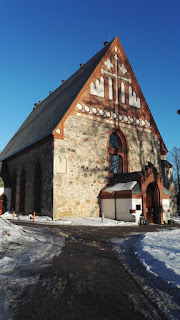Opera Box on
nyt tuonut näyttämölle hieman tuoreempaa oopperaa eli Benjamin Brittenin
Lucretian raiskauksen. Oopperan tapahtumat sijoittuvat Rooman valtakunnan
aikaan. Sodassa olevat
roomalaiskenraalit ovat joutuneet toteamaan, että heidän poissa ollessaan
heidän vaimonsa ovat löytäneet itselleen rakastajia. Poikkeuksena on Lucretia,
joka on uskollinen miehelleen Collatinukselle. Tämä ärsyttää toista kenraalia
Juniusta, joka yllyttää etruskiprinssi Tarquiniuksen viettelemään Lucretian.
Kun Tarquinius ei tässä onnistu, hän raiskaa Lucretian, joka häpeissään surmaa
itsensä.
Ikävä kyllä
ooppera on aiheeltaan vieläkin ajankohtainen. Raiskausta käytetään edelleenkin
ympäri maailmaa häpäisemisen välineenä ja vieläkin on olemassa yhteisöjä, jossa
tuomio kohdistetaan naiseen ja kuoleman katsotaan olevan ainut tapa pestä häpeä
pois.
Brittenin
oopperan rakenne oli kuitenkin hieman erikoinen, sillä päätarinalla oli myös
kaksi kertojaa (mies ja nainen), jotka kertoivat tapahtumia ja kommentoivat
näyttämön tapahtumia. Mieskertoja Lasse Penttisen ääni ei ihan ollut tehtävän
tasalla ja minua myös häiritsi naiskertojan Hedvig Pauligin ryntäily ja dramaattinen
ahdistuminen. Lauluosuudet hän kyllä hoiti oikein hienosti. Omituisinta
kertojien roolissa olivat kummalliset pätkät kristillistä paatosta libretossa.
Teos on tietysti oman aikansa tuotos, mutta en silti oikein ymmärtänyt, miten
ne liittyivät tarinaan.
Solistit
olivat onnistuneesti valittuja. Oma suosikkini oli Riku Pelo Juniuksena, mutta
pidin myös Liisa Viinasen Lucretiasta. Kamariorkesteri Ariadne teki myös upeaa
työtä. Brittenin musiikki oli ajoittain varsin vähäeleistä, mutta hienolta se
kuulosti.
Tällä kertaa
taustalla ei ollut videota eikä teoksessa ollut mukana tanssijoita, kuten niin
usein Ville Saukkosen ohjaamissa teoksissa. Eikä lavastuksessa ollut myöskään
yhtään laatikkoa, vaan lavastus perustui kankaisiin. Suuren osan aikaa lava oli
varsin paljas, mutta oikeastaan se sopi tähän teokseen. Puvustus oli todella
onnistunut. Sekä lavastuksesta että puvustuksesta vastasi Hanna Hakkarainen.
Muutamista
erikoisista piirteistä huolimatta siis ooppera on hyvinkin katsomisen arvoinen.
Näytöksiä on yksi jäljellä (2.4.), joten vielä on mahdollisuus nähdä se.

















